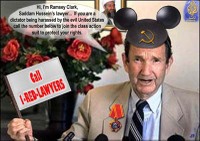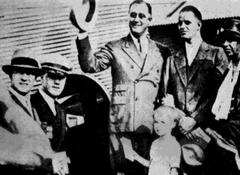
I want to revisit one of our 1966 Game Pieces in light of current events and an important political trend.
A year ago I compared Ramsey Clark to Alberto Gonzalez. I noted that he was following the Lyndon Johnson-Harry Truman-Franklin Roosevelt "Thesis of Unity" to its extreme end, and in so doing destroying the coalition he sought to represent.
Politically, Clark became a catalyst. He helped convince Middle America and (perhaps more important) American business that Democrats could not be trusted. His focus on the rights of poor people, and his evolving opposition to the Cold War Activity which was Vietnam, convinced businesspeople that they had no choice but to move, ever-more solidly, to the Republican Party.

While it’s true that the Republican Party has represented business
interests for most of its history, it’s important to remember that
there was a big split among businesses during the Roosevelt Era.
Despite the far-right rhetoric which dominates our discourse (because
it’s an essential ingredient in the Nixon Thesis of Conflict), FDR saved capitalism. Capitalists, which is to say big businesses, appreciated this.
The sins of business in the 1920s and 1930s reflect the sins of
business in this decade. They ignored the plight of their workers, of
the people who bought their products. They ripped-off small investors,
destroying the Middle Class during the Great Depression. Some, like IBM, did the work of our enemies.
What did Roosevelt do in response? He created a lot of cheap
alphabet-soup agencies which gave the appearance of advance without
really threatening business prerogatives. He put Hollywood to work,
portraying the rich first as silly, spoiled but well-meaning dolts (in
the 1930s), and then as patriots (in the 1940s). And the eventual flood
of deficit spending, during World War II, set American businesses up to
dominate the world in the decades following that conflict.
What Ramsey Clark, and the liberals of his time did wrong, was to
break this pact with business, to move ahead of where businesses felt
they would profitably go, to make businesses the enemy of the Left in
fact.
In fact, business has no ideology. Business is about doing what
works. Business does business regardless of the economic or political
system at hand. A system which encourages honest business will prosper,
while one that rewards corruption will fail, not because business has
an axe to grind, but because businesses bounded by law will work inside
the system to compete, while those unbounded by law will, if allowed
to, destroy the rest.
The big story of 2007, the one which no one sees, is a growing
estrangement between establishment businesses and the national
Republican Party. This is not a short-term phenomenon
we’re talking about, or at least the major Democratic candidates are
trying to make certain it’s not, which is why they are (on the whole)
laying low, much as Nixon himself did (ideologically) before his election:
- Hillary Clinton is pushing her husband’s "Third Way," a
business-oriented Democratic primary that gives rhetoric to the "far
left" but acts as Bill Clinton did, in business’ interests. - Barack Obama is pushing a consensus thesis in which business
has an integral place at the table. Movement by narrow majority will be
out. Grand themes supported by everyone (including the men and women in
the gray flannel suits) will be in. - John Edwards is offering a return to the Roosevelt Thesis.
He has the hardest road to hoe, because the assumption of the Nixon Era
remains that FDR was anti-business. Thus he’s falling in the polls.
What might push this historic re-alignment? What issue is the equivalent
to the anti-Vietnam, minority-rights, dirty hippie freak politics of
Ramsey Clark, something which might so threaten capitalists that they
would abandon the habits of a generation?
In other words, who’s Ramsey Clark now, in 2007, as opposed to 2006?










